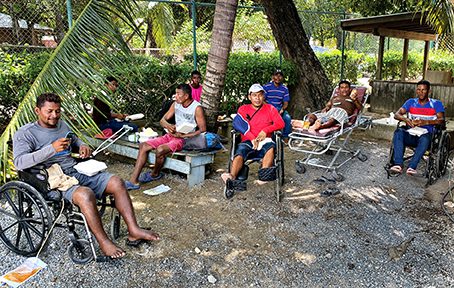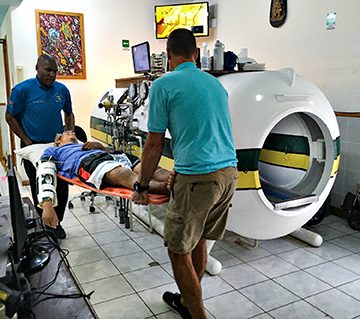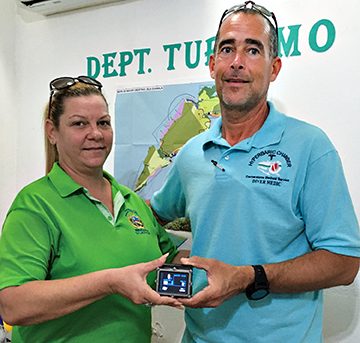
WITH CLEAR, WARM WATER, dozens of excellent dive sites, and the second-largest barrier reef in the world nearby, Roatán, Honduras, is a premier dive destination and a popular stop on the cruise ship circuit. But the country has other sides about which divers and tourists are unaware.
The island of Roatán benefits from tourism, but the mainland does not. Along the Mosquito Coast in the far eastern part of Honduras, the lobster fishery is one of the few opportunities for residents to make money, but it creates real dangers for the workers — particularly those who dive to harvest lobster.
These workers have little or no dive training, and some divers consume 20 to 25 tanks a day, often diving as deep as 180 to 190 feet on consecutive dives. They do so without adequate equipment and stay down until they are almost out of air, before rapidly surfacing long enough to attach their regulator to a new tank and descend again.
As experienced divers know, this is a perfect recipe for decompression sickness (DCS). I first became aware of the problems with lobster diving in 2014, when I was at a clinic and saw numerous patients, almost all locals, who were in wheelchairs or using crutches while waiting for hyperbaric treatment for DCS.
My son and I completed the National Board of Diving and Hyperbaric Medical Technology’s Diver Medic Technician (DMT) certification course in 2015 and began volunteering at the hyperbaric clinic in Roatán. Since then we have treated hundreds of divers, mostly Honduran lobster fishery workers who suffer some degree of paralysis from DCS, the majority from the waist down and many over most of their body.
In February 2018 we treated John, a lobster diver from Guanaja who worked to support a wife and three children. When he arrived at the clinic he was paralyzed from the neck down and received more than 30 hyperbaric treatments over about a month.
The boat owner is typically responsible for paying for the lobster divers’ treatments and any associated costs, but John was diving freelance and was personally responsible. While the clinic charges the lobster divers only for the cost of goods used (e.g., oxygen, medications, and supplies), the expenses can add up after multiple treatments. We were able to raise funds from several private donors to get John the recommended treatments.
Hyperbaric treatments usually relieve paralysis entirely or partially in most patients. When we released John, he was still paralyzed from the waist down and needed physical therapy. He would need to return for more chamber sessions as funding became available.
We stayed connected with John and his family over the following months. His wife had to quit her job to become a full-time caregiver. We helped them financially when possible and were able to visit them at their home in early October 2019. Unfortunately, John’s health declined due to various complications, and he died later that year.
As of this year, I have assisted with more than 1,000 individual treatments on lobster divers. In February 2020 I met with 24 lobster divers working on Guanaja to help them understand the dangers involved with repetitive deep dives. I identified steps they needed to implement to improve their ability to dive and continue to safely provide for their families.
We set up a system where the divers can borrow a dive computer that Shearwater donated to the municipality of Guanaja and return it at the end of the day. I work closely with the mayor of Guanaja to ensure that lobster divers properly use the equipment and safely perform their work. The divers know the computer will limit their dives far more than they want. Overcoming their previous practices and reinforcing a safety-first mentality is an ongoing effort.
We plan to continue working closely with government officials in Guanaja and expand the education program if we have the resources. We hope this work will reduce the number of deaths and injuries in the commercial lobster fishery and allow us to spend less time working on the treatment side of the hyperbaric chamber and more time on diver education and safety.
In addition to my involvement with the clinic, I recently started an initiative to educate the workers in the commercial lobster fishery on Guanaja in safe diving techniques. Continuing to provide them with the equipment and knowledge they need to safely do their work can help them provide for themselves and their families — hopefully without the short- and long-term consequences of severe DCS. AD


© Alert Diver — Q2 2023